Primary Results
All results are unofficial and do not include absentee ballots. Winners appear in bold. A ~ denotes the incumbent, if any.
City and Boroughwide Races |
|
| Mayor |
|
| City Comptroller |
|
| City Public Advocate |
|
| Manhattan District Attorney |
|
| Queens Borough President |
|
City Council Races |
|
| City Council for District 1 |
|
| City Council for District 2 |
|
| City Council for District 3 |
|
| City Council for District 4 |
|
| City Council for District 7 |
|
| City Council for District 8 |
|
| City Council for District 9 |
|
| City Council for District 10 |
|
| City Council for District 11 |
|
| City Council for District 12 |
|
| City Council for District 14 |
|
| City Council for District 16 |
|
| City Council for District 19 |
|
| City Council for District 20 |
|
| City Council for District 21 |
|
| City Council for District 23 |
|
| City Council for District 25 |
|
| City Council for District 26 |
|
| City Council for District 27 |
|
| City Council for District 28 |
|
| City Council for District 29 |
|
| City Council for District 31 |
|
| City Council for District 33 |
|
| City Council for District 34 |
|
| City Council for District 35 |
|
| City Council for District 36 |
|
| City Council for District 38 |
|
| City Council for District 39 (D) |
|
| City Council for District 39 (R) |
|
| City Council for District 40 |
|
| City Council for District 41 |
|
| City Council for District 42 |
|
| City Council for District 45 |
|
| City Council for District 49 |
|
Guide for the Last Minute (Primary) Voter
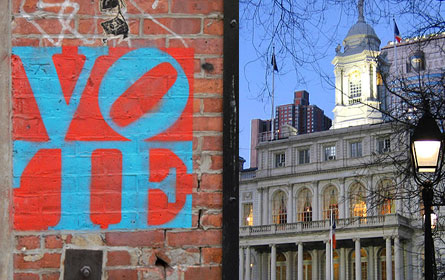
Only 18 months ago, Sept. 15, 2009 was shaping up to be a big day in New York City politics. Hundreds of thousands of New York City Democrats would go to the polls to choose between a slew of politicians and maybe even a rich businessperson or two to determine who would be the party's nominee for mayor. It would be a high point in a race sure to be spirited, expensive and maybe vicious.
At the same time in communities across the city, voters would choose new members of the City Council as the first class of term-limited officeholders prepared to return to private life or find something else to run for.
That, of course, will not happen. Mayor Michael Bloomberg and the City Council dashed the hopes of many city political junkies when they decided last year to give themselves an additional four-year term. Several likely mayoral candidates opted to hold on to their less-lofty posts for now. Meanwhile, a number of City Council hopefuls put their plans on hold for four years, figuring they would face better odds in going for an open seat than squaring off against an incumbent.
A number of other politicians and aspiring politicians, though, decided to stick to their plans to seek higher office or challenge an incumbent. As a result, while Sept. 15 may not offer the free-for-all some had anticipated, it does feature a number of closely fought contests and interesting candidates.
In citywide office, a scaled down field of candidates will vie for the Democratic nomination for mayor. Brushing aside the extension of term limits, Public Advocate Betsy Gotbaum and City Comptroller William Thompson both are vacating their posts (he to run for mayor), spurring spirited Democratic primary contests.
Council members seeking to move up left seven vacancies in their wake, and all feature competitive Democratic primaries. In addition -- unusually for New York -- a number of incumbents seem vulnerable, some because of their vote to override two voter referenda and extend term limits. Others are facing a tough challenge since being linked to alleged improprieties and a few because of their actions as members of the City Council
Add to this party offices, a district attorney race in Manhattan and other odds and ends and many New York Democrats, and even a few Republicans, have good reason to go to the polls on Sept. 15.
Researching the Races
To guide you through the election thicket, Gotham Gazette's Who's Running for What provides you with a list of all candidates running for office, what post they are seeking, how much money they have raised and other key information, as well as links to election coverage in other publications. Search by office, incumbent or candidate to find the campaign that interests you.
Along with this, we have updated our City Council district pages, linking them to Who's Running for What (and visa versa), which offer current contact information, demographics data and more.
To get started, go to our list of districts. The Board of Elections' poll site finder will tell you which district you live in.
Gotham Gazette reporters have produced original stories on some of this year's key contests. We will be providing additional articles up to the day of the primary. (See the list of stories at the right or go to Campaign Coverage.)
The Campaign Finance Board's Primary Election Voter Guide offers candidate lists by district, biographical information and candidates' answers to a few standard questions as well as voter information.
WNBC, the Campaign Finance Board and the Voter Assistance Commission have assembled a Video Voter Guide where candidates present brief comments on their candidacies. Boro Politics, presented by Community Newspaper Group, presents reporting from the local newspapers owned by Rupert Murdoch as well as debates from a number of council districts. The Daily News offers campaign coverage at its Brawl for the Hall blog.
For a complete list of all the contests, see the Board of Elections information on the 2009 primary.
Who Can Vote
Like all primaries in New York State, next Tuesday's election is open only to registered members of a party in which there is a primary contest. In New York City, this means mostly Democrats.
There is one district where any registered voter, regardless of party affiliation or lack thereof, can cast a ballot: the 38th Assembly District in Queens. On primary day, that part of Queens will hold a special election for all voters to fill the Assembly seat left vacant by the resignation of Anthony Seminerio. (For more on that contest, see "Filling a Vacancy" below.)
Since there are contested primaries for the three citywide offices, every registered New York City Democrat can vote.
Unusually this year, there are two Republican City Council primaries, one in Brooklyn and one in Manhattan (for more information, see "Council Candidates," below). Some Republicans in Brooklyn and Queens also can vote for people to fill party posts, such as members of the county committee and delegates to judicial elections.
Republicans in the Bronx and Staten Island along with independents and members of the Green, Working Families, Conservative, Right to Life and other smaller parties who live anywhere other than the 38th Assembly District can spend Sept. 15 at the beach without shirking their civic responsibility.
For information on registration, see How to Vote below.
City and Borough Offices
Topping the ticket for the Democrats is the mayoral primary. The once crowded field has essentially come down to two contenders: City Comptroller William Thompson Jr. and Queens City Councilmember Tony Avella. As of the Sept. 4 filing deadline, Thompson had raised $5.5 million in private funds, compared to a bit over $290,000 for Avella. Neither candidate had received any public matching money.
Thompson has emerged as the candidate of the Democratic establishment with backing from a number of members of Congress, former Mayor David Dinkins, the Working Families Party, and some unions, including DC 37, which is the city's largest municipal employee union, and the Transport Workers Union. Some Democrats have stayed out of the race or signed up with Mayor Michael Bloomberg, who will run as a Republican and an Independence Party candidate this year.
Few, if any, have endorsed Avella, but that does not seem to phase the council member. A frequent critic of real estate development in the city who often bucks the leadership in the council, he is styling himself as a fierce independent who will represent average working New Yorkers. Polls show Thompson with a substantial lead in the primary.
The winner will face Bloomberg and several candidates from smaller parties in November.
Democrats also will select their nominees for public advocate and comptroller. Four candidates are vying for each post. If no one gets 40 percent on Sept. 15, a runoff between the top two vote-getters will take place two weeks later.
The city's five borough presidents are all up for re-election. Three -- Brooklyn's Marty Markowitz, Helen Marshall of Queens and James Molinaro of Staten Island -- would have been pushed out by term limits this year. Once the extension was approved, they all decided to try and stick around for the next four years. The other two -- Manhattan's Scott Stringer and Ruben Diaz Jr. of the Bronx, who was elected early this year -- are also seeking re-election.
Only Marshall, a onetime member of the City Council, who was first elected borough president in 2001, faces a primary challenge. Her opponent, Mark Leavitt, is a lawyer and civic activist who has also performed with local arts groups. His platform sets out a number of issues, including creating a more activist borough presidency, protecting and improving Queens' many "main streets," promoting more parent involvement in schools and working to give community concerns a greater role in development decisions.
As of the Sept. 4, reporting date, Marshall had raised $178,061 in private funds, compared to $140,536 for Leavitt. But Marshall had not received any public matching funds, while Leavitt had almost $285,000.
In Manhattan, three Democrats have squared off in a closely fought contest to replace long-time District Attorney Robert Morgenthau, who decided not to seek re-election this year. The winner of the primary gets the job since there are no candidates from other parties. For more, see The Race to Fill Morgenthau's Shoes.
Kings County District Attorney Charles Hynes' term expires this year as well. In contrast to 2005, when he faced a crowded field of challengers, Hynes is unopposed this year. The other three district attorneys do not have to face the voters until 2011.
Council Contests
After the ballot bumping and the petition challenges, Democratic primaries will take place in 32 of the city's 51 City Council districts, according to the most recent candidate list from the Board of Elections. Democrats will chose their party's candidate to replace Councilmember Eric Gioia, Melinda Katz, John Liu, David Weprin and Tony Avella in Queens and Councilmembers Bill de Blasio and David Yassky in Brooklyn, all of whom decided to seek citywide office. Another seat, this one in upper Manhattan, was left open earlier this summer when incumbent Miguel Martinez pleaded guiltyto federal felony charges.
Experts see several other incumbents as facing tough challenges this year, evidenced by endorsements, fund raising and the presence of strong opponents. A couple -- Larry Seabrook in the Bronx and Kendall Stewart in Brooklyn -- have been tarnished by the City Council slush fund scandal, though neither has been charged with any wrongdoing. Some, such as Alan Gerson in Manhattan, may be vulnerable partly because they voted to extend term limits. Others are viewed by some in their districts as ineffective or have fallen out of favor with political powers.
Many of the incumbents will almost certainly coast to an easy victory -- as incumbents tend to do in New York. Whether anger over term limits -- and a general desire for political change -- will make this a tougher year than usual for those already in office, only the election returns will tell.
Unusually this year, there are a few scattered Republican contests. In District 4 on Manhattan's East Side, Ashok Chandra, a lawyer who works on new products for Bloomberg LP, and real estate expert Neil D'Alessi are vying for the chance to face incumbent Democrat Daniel Gardonick in November.
The other Republican primary is for the seat from District 39 in Brooklyn now occupied by Bill de Blasio, who is running for public advocate. Joseph Nardiello and George Smith are competing to see who will face the winner of the Democratic primary.
Filling a Vacancy
In an event that has become almost commonplace, voters in Queens have to fill a seat left vacant because the incumbent is a felon. In the case of the 38th district, which includes Woodhaven, Richmond Hill, Ozone Park, Glendale, Maspeth, Ridgewood, Middle Village, State Assemblymember Anthony Seminerio pleaded guilty to bribery charges, leaving the seat wide open.
The election will come after weeks of maneuvering during which Gov. David Paterson called the election for Sept. 15, canceled that decision and then decided to go ahead with the contest after all. By calling the election for Sept. 15, instead of November, there will be no primary for the seat. Five Democrats, including Michael Miller, attorney Albert Baldeo and Afghan war veteran Farouk Samaroo, had been gearing up for the primary.
Instead three Democratic Party leaders selected their nominee, Miller. This prompted Samaroo to go to court in an unsuccessful effort to stop the election.
Barring any last minute surprises, Miller, a Glendale resident and member of Community Board 5 who will appear on the Democratic, Conservative and Independence party lines, will face Republican and civic activist Donna Marie Caltabiano.
Other Offices
Sept. 15 features one judicial contest -- for Civil Court judge in Manhattan's Third Municipal district. Lynn Kotler, a lawyer with a private litigation practice, and Anna R. Lewis, a former law clerk and onetime Democratic district leader, will face off in a Democratic primary for the seat.
Kotler, who has the backing of much of the party's establishment, originally got Lewis removed from the ballot for not having enough valid signatures on her petitions. The incident sparked controversy because the official at the Board of Elections in charge of supervising the counting of signatures is an open Kotler supporter.
Some 11 Civil Court seats are up for election this year, but there will not be primareis for any of the other 10. In an editorial earlier this month, the Times criticized the situation saying, "Most Civil Court seats are filled by the reigning political clubhouses in each borough, which still largely control who gets to run on the Democratic line — the key to victory in November."
The Civil Court, which has jurisdiction over civil cases involving amounts up to $25,000 and other civil matters referred to it by the state Supreme Court, includes a small claims court for matters less than $5,000 and a housing court that handles landlord-tenant matters and housing code violations.
Primaries also provide political parties with the opportunity to fill their own internal offices. On Sept. 15, Democrats in parts of Manhattan will get to choose district leaders.
District leaders are intermediaries between the major political parties and the community in which they are elected. Together they form the governing bodies of the Democratic and Republican parties within their respective counties. The position is often seen as a stepping-stone to higher office, and many times is held by members of the State Assembly or City Council. Former New York City Mayor Ed Koch started his political career as a district leader.
Each district elects a male and female representative. District leaders are elected to four-year terms, are not paid and work within the political parties.
Democrats in Manhattan, as well as some Republicans in Brooklyn and Queens will be able to vote for members of their party's county committee. Part of the political party machinery, members of a county committee act as representatives for their political party on a very low scale. Usually their territory is only a few blocks and covers approximately 1,000 registered voters. Members of a county committee help select and endorse candidates for higher office.
In New York City thousands of these positions are often left vacant, according to the Grassroots Initiative, a nonprofits that provides information to people considering a run for public office.
A number of candidates on Tuesday are seeking election to posts that some New Yorkers want to eliminate: delegates and alternatives delegates to state judicial conventions. Those elected will attend a meeting to vote on their party's candidates for state Supreme Court, New York's main trial court. Their action at these meetings tend to be "a formality because the bosses have usually picked the nominees beforehand," wrote Carol DeMare in the Albany Times Union.
Formality or not, Democrats in Manhattan, the Bronx and Brooklyn, and Republicans in Queens can chose delegates and alternate delegates.
How to Vote
The election will be Tuesday, Sept. 15, with polls open from 6 a.m. to 9 p.m. Only registered voters who have registered at least 25 days before the election can vote. Since this is a primary, only registered members of parties with contests can cast ballots -- except in the Queens Assembly race.
You should have received a notice in the mail telling you where to vote, but if you do not have it, you can go to the Board of Election's poll site locator or call 1 866 VOTE-NYC. This number can provide you with other information as well, including registration deadlines.
On its Web site, the Board of Elections also has instructions on how to work the voting machine.
Absentee ballot applications can be obtained by calling the Board of Elections at 1-866-VOTE-NYC or e-mailing a request to This email address is being protected from spambots. You need JavaScript enabled to view it..
Those who wish to vote by absentee ballot have two choices. If you choose to vote by mail, an absentee ballot must be postmarked the day before the primary and reach the Board of Elections no more than seven days after the election. Or you can drop off an absentee ballot at one of the Board of Elections borough offices by 9:00 p.m. on Election Day.
If the deadline for requesting an absentee ballot by mail has passed and you cannot appear at the polls on Election Day because of an accident or sudden illness, you may send a representative with an authorized letter to receive an Absentee Ballot Application and Absentee Ballot and return both to the Board of Elections by 9 p.m. on Election Day at your borough office.
Amid Fireworks, the Senate Stalemate Continues
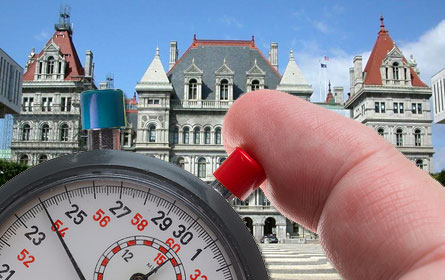
For updates on the impasse in Albany and its effect on New York City, stay tuned to The Wonkster.
As the state enters week four of the Albany impasse, New York City is out about $6 million -- which the city projects will grow to $60 million -- and has a new governing body of sorts for its public school system.
The State Senate spent the holiday weekend trapped in the capital. No fireworks allowed.
And leaders on both the Republican and Democratic sides in Albany still have not come to an agreement over who controls the State Senate. Democrats have moved on a number of bills affecting local government across the state, including voting down the city's sales tax increase, but everyone else in Albany argues the votes don't count. Republicans have urged Democrats to meet in public, but Democrats have continually failed to appear.
All this in less than a month, and some fear we could have a whole summer full of Senate squabbling.
It has been an embarrassment to the state. But for the city and Mayor Michael Bloomberg's agenda, there are much larger consequences.
Losing Revenue
In failing to pass legislation, the Senate added a new item to its ever-growing list of casualties: the city's budget. In order to close a gaping budget hole, the City Council and the Bloomberg administration agreed to increase the city's sales tax by 0.5 percent, bringing it up to a total of 8.875 percent. The hike was expected to increase city revenues by $518 million, and was supposed to go into effect on July 1 -- the first day of the city's fiscal year 2010.
Now the measure is floundering in Albany's dysfunction, and its support in the State Senate is now questionable.
Of all the bills the Senate Democrats took up in what most consider an invalid vote Tuesday, the sales tax was the only measure that was defeated, going down 19 to 13. The opposition was led by Bronx Sen. Bronx Ruben Diaz Sr. who said by raising the sales tax the city was balancing the budget on the backs of the poor.
On Wednesday, Bloomberg said he was as "surprised as anybody" that the measure did not receive support in the Senate. Any more cuts, which the city may have to make now that its will not get the expected sales tax revenues, will be "very painful," the mayor added.
"We have a hole of at least $60 million created yesterday," the mayor said.
According to administration officials, the city will lose $2 million in revenue every day it must go without the tax increase. Because the legislation is written to take effect on the first day of the following month, the city already will lose out on revenue for all of July -- costing a total of $60 million, officials said.
That sum, according to the administration, could support 600 police officers or the Fire Department's 198 engine companies and 143 ladder companies.
The Assembly has already approved the tax measure.
Into the Sunset
The effect of the inaction on school governance is harder to predict. For the past few months, Bloomberg has sought to portray the expiration of mayoral control of the school system in its most apocalyptic terms: riots in the streets, a return to the Soviet Union and so on.
But on Thursday afternoon, seven members of the newly resurrected Board of Education, which includes three deputy mayors, met at the Tweed Courthouse to calmly approve the designation of Joel Klein as schools chancellor, giving him the same responsibilities he had a day before under mayoral control. They also passed a resolution urging the State Senate to speedily approve the extension of mayoral control. They then decided not to meet again until September 10 -- the day after school starts.
It appeared that little had changed in the city's school system.
In a press briefing yesterday, Bloomberg said: “What we’re trying to do here is to continue on as though mayoral control was approved, and it’s our assumption that it will be sometime in the very near future. If in the fall we find out that it wasn’t, we have a different set of issues." Until that happens, Bloomberg said, it will be business as usual inside city schools.
The mayor kept control over the school system because the majority of the borough presidents, who appoint five out of the seven members of the Board of Education, named mayoral allies who largely support his running of the school system.
Only Bronx Borough President Ruben Diaz Jr. selected an appointee, Dolores M. Fernández, who has questioned the mayoral control policy. But even she approved the re-appointment of Klein.
On Wednesday, Diaz said he “never had a problem telling the chancellor what’s on my mind... I am not here to rubber stamp anyone.”
The other borough presidents said they too would speak out if the chancellor adopted a policy they disagreed with. But, considering the Board of Education will not meet until September -- if it meets at all -- it is unlikely the borough president's appointees will have any influence over city schools.
“We think this is a total sham,” said Jane Hirschmann, of Time Out From Testing, who was kicked out of Wednesday's press conference for not having media credentials. “This is still the mayor."
The Senate Bills
If and when the Senate returns to business, what will happen to mayoral control? The Assembly has already passed a bill -- proposed by Speaker Sheldon Silver -- that essentially retains the current system. The mayor supports that legislation.
Sen. Frank Padavan has sponsored that bill in the Senate and has said he thinks at least 40 senators would vote for it if it came to the floor.
It does not, though, have the backing of new Democratic leader Sen. John Sampson. He has offered his own mayoral control bill, which would continue to let the mayor name most members of the Panel for Educational Policy -- the largely toothless body that replaced the board -- but would require those members have set two-year terms. They currently serve at the pleasure of the official who appoints them.
While the change might seem arcane, set terms have emerged as a kind of litmus test issue in the fight over mayoral control.
"This bill is a poison pill," a Bloomberg aide told the Daily News. "Voting yes on this bill is the same as voting yes on the expiration of the mayoral control law."
Further complicating the picture is the fact that the Assembly is no longer in session. Under normal circumstances, if the Assembly and Senate pass different bills on the same issue, the two sides hold a conference to come up with a compromise measure. But that cannot happen if the Assembly has gone home for the summer.
"If the Assembly is in town and in session we can have negotiations," Sen. Liz Krueger said last week. 'Without the Assembly in town we are obviously in a situation where if we didn't pass the one law, it sunsets. If we wanted to pass something, we only had the one bill option."
Sampson and his allies, though, have said repeatedly that the mayor cannot browbeat them into passing his version of mayoral control. Among themselves, Sampson said in a written statement, Democrats "may have different opinions on school governance, but we are firmly opposed to mayoral control of the Senate."
A number of senators may welcome the chance to discus school governance further. "You know I have relative comfort with the bill that passed the Assembly but know we could have done better," said Krueger. "I wanted to see stronger language for the role of [community] superintendents and their authority."
Some critics of the current system go further, expressing relief that the chaos could derail passage of the Silver proposal.
As mayoral control sunset, the Parents Commission on School Governance, which seeks a greater role for parents in the running of the schools, released s statement saying, "Many parents will celebrate the removal of an oppressive dictatorial system that has not served their children well. We look forward to working in the future with the Senate, the Assembly and the governor to install a new governance system, with adequate checks and balances and a real voice for parents, in which no one, no matter how wealthy and powerful, can make all the decisions when it comes to our children."
Breaking the Logjam
We know state senators like their weekends. Being a patriotic lot, they probably adore the time they have to barbecue with family, attend parades and do the whole bit on the Fourth of July.
Last week Gov. David Paterson called them into special session, senators put on their happy faces and told reporters a deal was at hand and asked Paterson to send them home to cool off. No such deal came together.
On Wednesday, Paterson issued proclamations for special sessions through July 6. You would think both sides would be in a hurry to get a deal done, pass important legislation and then get out of Albany. But at this point the prospects of a deal seem fairly slim. Although there is still a glimmer of hope.
Democrats don’t appear in a hurry to jump-start negotiations. Last week Democrats said they would not negotiate with Republicans unless negotiations occurred in public -- apparently in a bid to embarrass their opponents. But Republicans twice last week took up the offer, only to have the Democrats turn them down. Democrats said they would be willing to negotiate in public on Thursday, but again they were no-shows.
Meanwhile, Sampson said on Wednesday that the Senate is in “summer recess at this point in time.”
Last week Democrats were calling on Republicans to stop focusing on long-term leadership issues and instead come to an agreement on a short-term plan that would allow both sides to vote on time sensitive legislation. But now Democrats claim they have already addressed most of the non-controversial legislation during Tuesday's session, which was spurred by Sen. Frank Padavan’s jaunt through the Senate chamber on his way to get a V8.
Now the governor, the Assembly and Senate Republicans wonder whether the Democrats' action was legitimate. Paterson has refused to sign the bills supposedly approved by the Senate, and the Assembly has declined to send the bills to the governor -- a normal pro forma legislative action. If the bills do become law, Republicans are likely to go to court to try to stop them.
Republicans are already quite busy with legal cases. They have a case pending against Angelo Aponte, secretary of the Senate. The charge he prevented them from submitting new legislation or printing bill jackets, blocking them from the Senate rostrum and generally making it hard for them to function as part of the Senate. Republicans want to block Aponte from performing his duties. If they win that case, it will go a long way toward legitimizing the June 8 vote that Republicans claim made Sen. Pedro Espada president of the Senate and Sen. Dean Skelos majority leader.
Republicans are also appealing a decision by Supreme Court Justice Joseph Teresi that requires Republicans and Democrats to show up in the Senate chamber at the same time during extraordinary sessions. Republicans claim other branches of government should not meddle in legislative business. But late Wednesday Espada and Skelos asked Paterson to help broker negotiations in his office.
Most of the Democrats didn't seem to be in any hurry to join in. They still feel securely in control of the Senate majority offices, along with the payroll and the staff that makes the legislative process work. But late Thursday leaders from both sides met in Paterson's office. They presented the governor with the proposals that have yet to yield an agreement. "Both Senator Espada and our conference, we have a short-term and long-term agreement," Malcolm Smith told reporters."We are trying to get the two of them together, so we can determine how to move forward. The governor has agreed to look at both agreements and we'll try to come back tomorrow."
After the Deadline...
For updates on the impasse in Albany and its effect on New York City, stay tuned to The Wonkster.
On Tuesday, it became painfully clear that the chaos in the Senate had doomed any hopes that the legislature could perform its most basic duties. As New York City waited to see if the Senate would reauthorize mayoral control of schools and approve a measure that would help the city balance its budget, senators thrashed about in a nasty power struggle that left interested parties stunned, disgusted and angry.
At noon, Democrats said they had a quorum because Republican Sen. Frank Padavan had walked across the chamber while their session started. The Democrats began to read bills on the non-controversial calendar -- bills that pass unless someone raises an objection. There were no objections until the bill that would raise the city’s sales tax came up. Sen. Ruben Diaz Sr. animatedly asked that the bill be put aside. Instead, it came to a vote and was defeated 19 to 13.
Sens. Diaz and Hiram Monserrate said that they did not want the low-income residents of their districts to carry the burden of balancing the city budget. Diaz suggested Mayor Michael Bloomberg use his own wealth for that purpose. Some Senators said the bill was killed to use as leverage in coming negotiations with Bloomberg over mayoral control.
In the end, it turned out the vote did not really matter. Padavan said he had entered the chamber inadvertently, meaning the Senate did not have a quorum after all. Gov. David Paterson said he would not sign any of the bills passed during the so-called session.
The defeat of the revenue bill and the Senate's failure to vote on mayoral control indicates that, as long as the chaos persists in Albany, the Bloomberg administration may find things tougher than ever in the capital. Former Democratic Majority Leader Sen. Malcolm Smith had made it clear he would work with Republicans on passing a school governance bill the mayor could accept. Both mayoral control and the city sales tax increase would likely pass the Senate by a lopsided count if Republicans ran things.
Under the tenuous leadership of Sen. John Sampson, who has been described as "anti-mayor," Democrats repeatedly rejected appeals from Bloomberg to act on legislation affecting the city, telling him to pressure the Republican caucus to reach a power sharing agreement.
Losing Revenue
In failing to pass legislation yesterday, the Senate added a new item to the ever-growing list of casualties: the city's budget. In order to close a gaping budget hole, the City Council and the Bloomberg administration agreed to increase the city's sales tax by 0.5 percent, bringing it up to a total of 8.875 percent. The hike was expected to increase city revenues by $518 million, and was supposed to go into effect on July 1 -- the first day of the city's fiscal year 2010.
Now the measure is floundering in Albany's dysfunction.
Before what turned out to be an invalid vote yesterday, the administration appeared confident that the increase would pass. On Monday night, Bloomberg's press secretary Stu Loeser issued a statement arguing the measure should be brought to the floor because there was support for it.
"Sen. John Sampson stated today that passing taxes necessary to preserve essential city services and avoid layoffs and a bill that would prevent New York City schools from returning to chaos were controversial," said Loeser in an e-mailed statement. "They are not, and both enjoy the support of a bipartisan majority of state senators. Both pieces of legislation -- which already have the votes for passage -- deserve to be brought to the floor for a vote. That's democracy, and if the city's budget and public schools continue to be held hostage to the Senate's gridlock, it will cause real harm to New York families and the health of our city."
According to administration officials, the city will lose $2 million in revenue every day without the tax increase. Because the legislation is written to take effect on the first day of the following month, the city already will lose out on revenue for all of July -- costing a total of $60 million, officials said.
That sum, according to the administration, could support 600 police officers or the Fire Department's 198 engine companies and 143 ladder companies.
The Assembly has already approved the measure.
Into the Sunset
The effect of the inaction on school governance is harder to predict. For the past few months, Bloomberg has sought to portray the expiration of mayoral control of the school system in its most apocalyptic terms: riots in the streets, a return to the Soviet Union and so on. But in a press briefing yesterday, Bloomberg said his administration "will work hard to shield New York's children and their parents from the chaos." Schools, he said, "will not be padlocked" and summer school will open as scheduled today.
Instead of invoking images of angry mobs on the Grand Concourse, Bloomberg said the confusion over how to run the system would bring in lawyers -- and litigation. "Every decision -- from personnel decisions to policy decisions -- will be subject to litigation and uncertainty," Bloomberg continued.
That confusion arises partly because, as Philissa Cramer observed in Gotham Schools, the school governance law passed in 2002 calls for the law to sunset after seven years but "doesn’t include instructions for reconstituting the old school board or dismantling the current system."
The mayor foresees "a nightmare flashback to the days when politics ruled the schools." But some experts believe he may be overstating the effects of the current law's expiration. While the city would have to reconstitute a Board of Education, they say, that board could decide to continue most school policies and practices while waiting for the legislature to pass a school governance bill.
"If the mayor acts... at least changing the structure on top, then I think it's wrong to foresee any potential litigation," Udi Ofer, the policy director of the New York Civil Liberties Union, has said.
David Bloomfield, an expert on education law who teaches at Brooklyn College, has said the state education law provides for clear lines of authority. Bloomfield sees only two credible circumstances that could lead to litigation: The mayor could file suit against a Board of Education or suits could be filed against the administration if he decides to ignore the resurrected board.
Reconstituting the Board
When mayoral control replaced the old Board of Education, borough presidents lost one of their few legally defined responsibilities. Each borough president appointed one member of the board; the mayor named two. The current turmoil -- and possible return of the board -- has focused some attention on the presidents.
Earlier this month, Manhattan Borough President Scott Stringer proposed a plan for preserving stability if mayoral control runs out. Among other things, he called for the mayor and borough presidents to appoint a board on July 1 and have it meet immediately. The board, he said, should then vote to retain Joel Klein as schools chancellor -- under the old system, the board, not the mayor, named the chancellor -- and "form a committee to study how the board can ensure that accountability and the current successes of the system can be maintained."
So far, though, Bloomberg has given no indication he would call such a meeting. While Online Education in American reported that administration officials were conferring with the borough presidents, they say "it's not yet clear that Mayor Bloomberg will cooperate with plans to reconvene a Board of Education tomorrow." In fact, the blog indicates Bloomberg could call in lawyers -- and seek an injunction to prevent the schools from going back to the old system and to block the creation of a new Board of Education.
Yesterday, as it seemed increasingly likely that the State Senate would not vote on mayoral control, Bronx Borough President Ruben Diaz Jr. moved to name his appointee to the not-yet- resurrected Board of Education, choosing Dolores Fernandez, a former president of Hostos Community College and a professor of urban education at the City University of New York’s Graduate Center.
"Though I am a supporter of some form of mayoral control, and I am disappointed that the current law was allowed to expire, the business of our children is too important to wait for Albany to act," Diaz said in a prepared statement.
Three other presidents -- Stringer, Marty Markowitz of Brooklyn and Helen Marshall of Queens -- said they have selected their board appointees but will not announce names until the clock runs out on mayoral control. (The fifth president, James Molinaro of Staten Island is on vacation, according to his office.)
Echoing some of Stringer's recommendations, Markowitz issued a statement saying he "would advise that a reconstituted board meet tomorrow (Wednesday) morning and take immediate action to preserve continuity of all processes and make this transition as smooth as possible for the families of New York City -- as we collectively move to resolve the matter in Albany."
As to whether the board would then vote to keep Klein, it seems likely. Four of the borough presidents have said they would keep the chancellor at least for the time being. The one exception -- Diaz -- has indicated he has "mixed opinions" on Klein.
The Senate Bills
If and when the Senate returns to business, what will happen to mayoral control? The Assembly has already passed a bill -- proposed by Speaker Sheldon Silver -- that essentially retains the current system. The mayor supports that legislation.
Padavan has sponsored that bill in the Senate and has said he thinks at least 40 senators would vote for it if it came to the floor.
It does not, though, have the backing of new Democratic leader Sampson. He has offered his own mayoral control bill, which would continue to let the mayor name most members of the Panel on Educational Policy -- the largely toothless body that replaced the board -- but would require those members have set two-year terms. They currently serve at the pleasure of the official who appoints them.
While the change might seem arcane, set terms have emerged as a kind of litmus test issue in the fight over mayoral control.
"This bill is a poison pill," a Bloomberg aide told the Daily News. "Voting yes on this bill is the same as voting yes on the expiration of the mayoral control law."
Further complicating the picture is the fact that the Assembly is no longer in session. Under normal circumstances, if the Assembly and Senate pass different bills on the same issue, the two sides hold a conference to come up with a compromise measure. But that cannot happen if the Assembly has gone home for the summer.
"If the Assembly is in town and in session we can have negotiations," Sen. Liz Krueger said last week. 'Without the Assembly in town we are obviously in a situation where if we didn't pass the one law, it sunsets. If we wanted to pass something, we only had the one bill option."
Sampson and his allies, though, have said repeatedly that the mayor cannot browbeat them into passing his version of mayoral control. Among themselves, Sampson said in a written statement, Democrats "may have different opinions on school governance, but we are firmly opposed to mayoral control of the Senate."
A number of senators may welcome the chance to discus school governance further. "You know I have relative comfort with the bill that passed the Assembly but know we could have done better," said Krueger. "I wanted to see stronger language for the role of [community] superintendents and their authority."
Some critics of the current system go further, expressing relief that the chaos could derail passage of the Silver proposal.
"Mayoral control will sunset tonight at midnight," the Parents Commission on School Governance, which seeks a greater role for parents in the running of the schools, said in a statement released last night. "We predict that there will be no rioting in the streets, no chaos or confusion. Instead, many parents will celebrate the removal of an oppressive dictatorial system that has not served their children well. We look forward to working in the future with the Senate, the Assembly and the governor, to install a new governance system, with adequate checks and balances and a real voice for parents, in which no one, no matter how wealthy and powerful, can make all the decisions when it comes to our children."
Breaking the Logjam
No school bill or city revenue package, though, seems likely to pass until there is a power-sharing agreement between the two parties, and the prospects of that look bleaker by the minute.
Tuesday was supposed to be the deadline for a deal -- the line senators would not cross. Instead it now testifies to the difficulty of reaching any agreement. On Monday, many senators must have sensed the failure ahead as they desperately tried to place blame for the impending collapse. Senators saw the train coming and they pushed each other in front of it.
Republicans blamed Democrats for a breakdown in talks, saying that the fractured Democrats have disrupted negotiations by switching representatives at the negotiating table in midstream. For their part, Democrats faulted the Republicans, saying they would only look at long-term solutions and so were unwilling to hold a session with neutral leadership to vote on non-controversial bills.
Tuesday opened with both sides of the conflict in the chamber at 10 a.m. -- but only thanks to a judge's order. In the brief moments they were there, Sen. Dean Skelos offered to negotiate in public later in the day. Smith responded by saying Democrats would hold a "regular session" at noon. Session was then adjourned. "Bullshit!" said Monserrate. He excused himself, but he was not the only senator to utter the phrase.
As senators from both sides exited the chambers, Republican Sen. Tom Libous went to the doorway of the Democratic chamber and asked to speak to Sampson. A Senate staffer waived Sampson over, and the two men entered the Democrats' lounge, talking. Maybe the senators had realized the urgency of getting back to work after all.
About 20 minutes later, chatter was heard in the Senate hallway. Staffers instructed the sergeant at arms that something would take place at noon. A table and four chairs were arranged in the center of the hall on the dividing line between the Republic and Democratic sides of the chamber. A lighting rig was set up, along with a Senate television camera and velvet ropes. It looked as though something important was about to happen.
But it didn't. A Democratic staffer called off whatever it had been. It wasn't clear who had actually called the event, and staffers from both sides disavowed any knowledge of who might have arranged it. It seemed a fitting end to a day already colored by dysfunction and posturing -- but it was only the beginning.
As press shuffled away from the conference, Democratic staff began herding their senators into the Senate chamber, telling them, "We have a quorum!" Padavan had walked through the chamber to avoid the crowd in the hall, and Democrats decided to take his presence as a sign that he was present to begin voting on legislation. With that, Democrats began steamrolling through bills. They took sworn affidavits from those who witnessed Padavan’s stroll through the chamber as Padavan countered with his own, saying he had not intended to give Democrats a quorum.
This is the absurdity that has enveloped the state capital for the last three weeks. There will certainly be more legal action, more cases and appeals filed -- and probably more farcical moments. But for New York City and municipalities across the state, the Senate’s inaction has real consequences.
In the Senate chamber on Tuesday, staff that had yet to come to terms with the likelihood that the Senate debacle might drag on over the summer contemplated the mess. Asked what he might do on the Fourth of July, one staff member said, "I was going to be cooking and eating burgers with the wife and kids." He then asked, "Are they really going to be back here?" Paterson has promised to call the Senate to session even on the Fourth of July.
Later, as Democrats churned out legislation as if they were late for a fundraiser, another staffer said in pure astonishment, "They have smiles on their faces like it's a joke, like they are getting away with something! We're gonna be here for a while."
State Senate 33
State Senate 33
Kingsbridge, Van Cortland Village, Norwood, Kingsbridge Heights, Bedford Park, University Heights, Fordham, Tremont, Mount Hope, East Tremont, Bronx Park South
|
State Senate Representative Party: D |
 |
|
Committee Assignments: Banks,Crime Victims, Crime and Correction,Finance,Health,Higher Education, Labor |
Contact: |
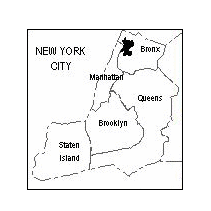
|
Detailed Image of this District Who's Running in this District |
Related Gotham Gazette original coverage
J. Gustavo Rivera in the news
via Google News
State Senate 34
State Senate 34
Morris Park, Pelham Parkway, Throgsneck, City Island, Woodlawn, Norwood, Wakefield, Yonkers, Pelham, Pelham Manor, New Rochelle, Mount Vernon
|
State Senate Representative Party: D, WF, I Committee Assignments: Alcoholism and Drug Abuse - Chair Person,Cultural Affairs, Tourism, Parks and Recreation,Hudson Valley Delegation - Chair Person,Local Government,Mental Health and Developmental Disabilities,Task Force on Government Efficiency - Chair Person,Temporary Committee on Rules and Administration Reform,Veterans, Homeland Security and Military Affairs |
 |
|
Albany Office: |
Contact: |
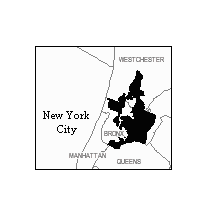
|
Detailed Image of this District Who's Running in this District |
Related Gotham Gazette original coverage
Jeffrey Klein in the news
via Google News
State Senate 31
State Senate 31
West Side of Manhattan, Northwest Bronx
|
State Senate Representative Party: D, WF, I Committee Assignments: Codes (Chair); Children & Families; Environmental Conservation; Energy & Telecommunications; Higher Education; Judiciary; Cultural Affairs, Tourism, Parks & Recreation |
 |
|
Albany Office: |
Contact: |
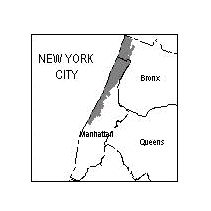
|
Detailed Image of this District Who's Running in this District |
Related Gotham Gazette original coverage
Eric Schneiderman in the news
via Google News
- Mayors, supervisors support anti-drug abuse proposal - Times Herald-Record
- Jonathan Rosen, BerlinRosen - Crain's New York Business
- What you should know about an FBI interview involving a former aide to Sen. Diaz - Albany Times Union
- AG Eric Schneiderman: Head Of Ruben Diaz-Linked Nonprofit Siphoned Funds To ... - New York Daily News (blog)
State Senate 30
State Senate 30
Harlem, Upper West Side, Washington Heights
|
State Senate Representative Party: D, WF Committee Assignments: Budget and Tax Reform,Civil Service and Pensions,Codes,Corporations, Authorities and Commissions,Environmental Conservation,Finance,Judiciary,Labor,New York State Conference of Black Senators,Rules,Transportation |
 |
|
Albany Office: |
Contact: |

|
Detailed Image of this District Who's Running in this District |
Related Gotham Gazette original coverage
Bill Perkins in the news
via Google News
- African-American State Senators Adams, Parker, Perkins To Wear Hoodies For ... - New York Daily News (blog)
- 6 NY lawmakers wear hoodies in honor of Fla. teen - Greenwich Time
- NY lawmakers to wear hoodies in chamber to show outrage over shooting death of ... - The Republic
- Partisan tensions rising in state Senate - North Country Public Radio
State Senate 29
State Senate 29
Manhattan's West Side from 77th Street to Battery Park, sections of East Midtown, Lower East Side, Little Italy, Chinatown
|
State Senate Representative Party: D, WF Committee Assignments: Codes,Cultural Affairs, Tourism, Parks and Recreation,Finance,Health,Mental Health and Developmental Disabilities, Rules |
 |
|
Albany Office: |
Contact: |
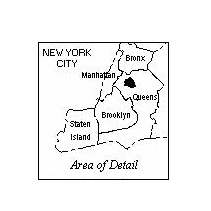
|
Detailed Image of this District Who's Running in this District |
Related Gotham Gazette original coverage
Thomas K Duane in the news
via Google News
- Redistricting removes piece of Chelsea from Duane's domain - Gay City News
- Local candidates will speak at next Republican Club meeting - Aiken Standard
- John DiStaso's Granite Status: Former Huntsman delegate Paul Collins moves to ... - The Union Leader
- Albany Democrats' Delay Tactics Hold Up State Senate Agenda - NY1
State Senate 28
State Senate 28
South and West Bronx, East Harlem, Roosevelt Island, parts of North Yorkville, Upper Washington Heights
|
State Senate Representative Party: D, WF Committee Assignments: Banks,Cultural Affairs, Tourism, Parks and Recreation,Education,Environmental Conservation,Higher Education,Judiciary, Task Force on Government Efficiency,Temporary Committee on Rules and Administration Reform |
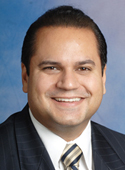 |
|
Albany Office: |
Contact: |
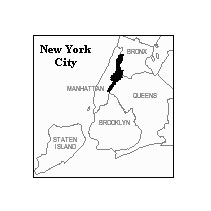
|
Detailed Image of this District Who's Running in this District |
Related Gotham Gazette original coverage
Jose M. Serrano in the news
via Google News
State Senate 27
State Senate 27
Sheepshead Bay, Manhattan Beach, Marine Park, Mill Basin, Bergan Beach, Flatbush
|
State Senate Representative Party: D Committee Assignments: Social Services, Children and Families (Chair); Aging; Crime Victims, Crime and Corrections; Energy and Telecommunications; Finance; Insurance; Veterans, Homeland Security and Military Affairs |
 |
|
Albany Office: |
Contact: |
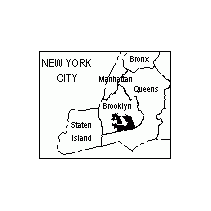
|
Detailed Image of this District Who's Running in this District |





